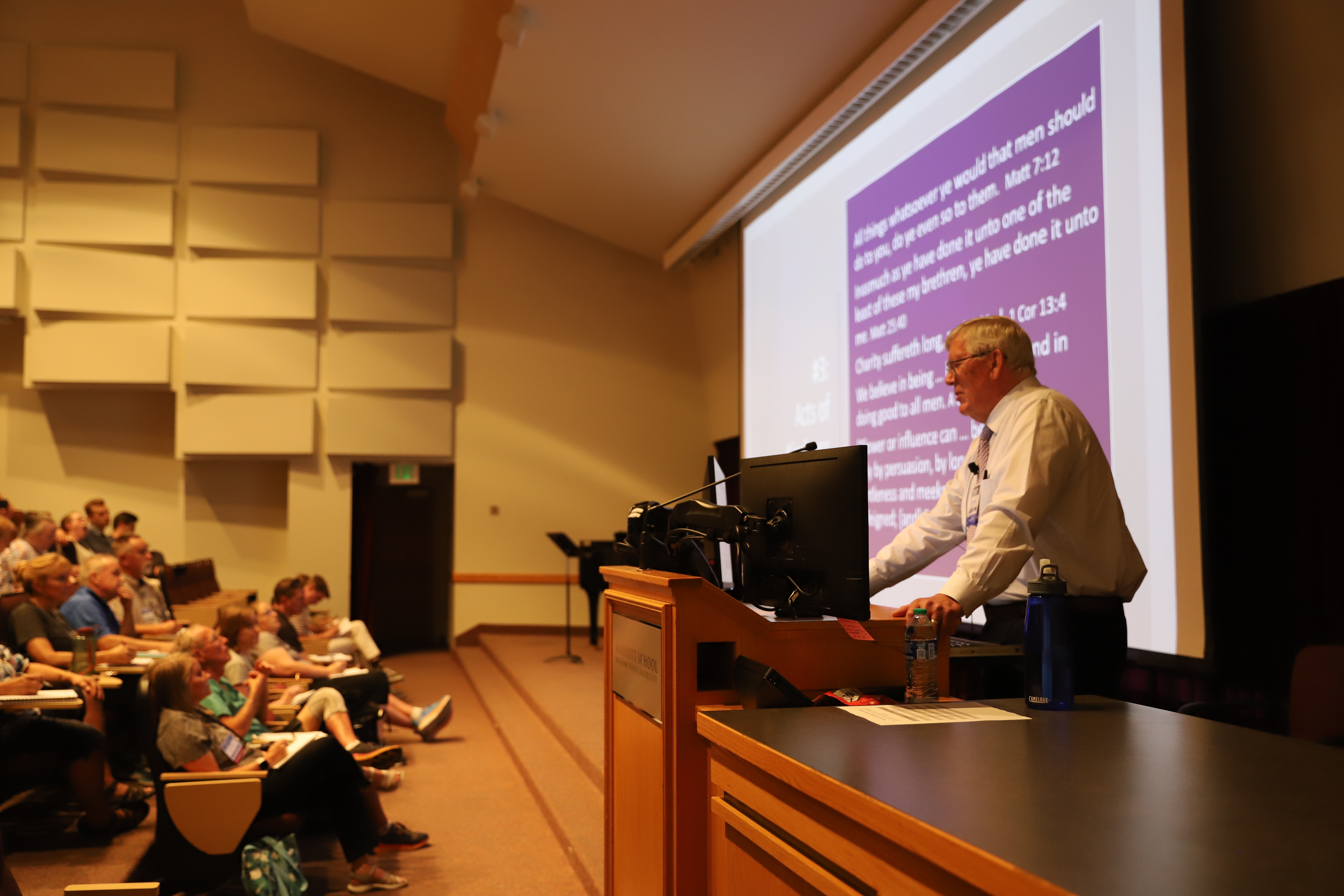
Lyle J. Burrup, a mental health specialist retired from The Church of Jesus Christ of Latter-day Saints’ Family Services, taught about how to find authentic happiness through the Gospel of Jesus Christ and psychology during BYU Education Week on Monday, Aug. 21.
His lecture titled “What Positive Psychology and the Gospel teach about Authentic Happiness” included psychological concepts from the theory of “Positive Psychology.”
The field of psychology is beginning to align more closely with the Gospel of Jesus Christ, Burrup said.
“We’re getting some really great stuff that is very consistent with what the Lord has been telling mankind since the beginning,” he said.
He said both psychology and the Gospel teach that happiness is a result of a combination of many things in life. These things cannot be discovered on TV or bought in a store, but come from one’s own actions and efforts.
Burrup quoted Joseph Fielding Smith who said:
“Happiness is the object and design of our existence; and will be the end thereof, if we pursue the path that leads to it; and this path is virtue, uprightness, faithfulness, holiness, and keeping all the commandments of God.”
President Joseph Fielding Smith
Seven traits of authentically happy people
Burrup introduced seven traits that authentically happy people possess, that he pulled from the Positive Psychology and the Science of Happiness.
First, Burrup said that authentically happy people have spiritual engagement and meaning.
Those who have this trait often use religion as a support system and strategy to cope with the difficulties that cause unhappiness, according to Burrup. Regulations, or commandments, of most faiths decrease the likelihood of experiencing major stressors in life, such as incarceration.
The second authentically happy trait is having close relationships with others.
Burrup said people need at least one close relationship in their life to be happy and to avoid loneliness. Loneliness can lower the levels of meaning in one’s life and cause depression.
“So when God says to us … love they neighbor as thyself, this is what he’s talking about. It isn’t just for righteousness, its for our own benefit,” Burrup said.
Burrup said the third authentically happy trait was participating in acts of kindness.
Burrup said people who perform acts of kindness benefit mentally. He also said that a person who consciously receives the kind act and actively engages with it experiences greater happiness than someone who passively receives kindness.
Burrup’s fourth trait is having strengths and virtues.
Burrup mentioned six basic virtues upon which individuals can focus their development to become more authentically happy: knowledge, courage, love and humanity, justice, temperance and spirituality. He suggested that individuals take time to ponder what their own personal strengths are using prayer and other resources such as their patriarchal blessing.
The fifth trait found in authentically happy people is a positive mindset.
Burrup said a positive mindset includes gratitude, optimism and mindfulness. He described gratitude as the parent of all other virtues and said that gratitude leads to increased happiness and happiness leads to increased gratitude.
The sixth authentically happy trait is exercise and physical wellbeing.
Burrup said physical health correlates directly with mental health. When an individual takes care of their physical needs, they are happier.
The seventh and final trait found in authentically happy people according to Burrup is something he referred to as flow.
Burrup described flow as “the joyful sensation one experiences when they are actively involved in trying to reach a goal, or an activity that is challenging but well suited to one’s skills.”
Flow involves focused attention, full concentration and complete involvement in the activity which causes a lack of self consciousness, according to Burrup.
He quoted D&C 58:27, “Verily I say, men should be anxiously engaged in a good cause, and do many things of their own free will, and bring to pass much righteousness.”
Healing through happiness and the Atonement of Jesus Christ
Along with the seven traits, Burrup discussed the link between physical and mental health. When an individual changes the way they perceive the world, it initiates a change in the body’s cells.
He said studies in psychology show constant negative or angry thoughts in one’s mind leads to an overall negative impact on an individual’s physical wellbeing. Likewise, positive thoughts lead to positive impacts.
Lorie Loe, who is visiting campus to attend Education Week from Saint George, Utah, said that this link stood out to her the most from Burrup’s lecture.
“These days we see so much anxiety and stress, it results in actual physical ailments,” she said.
Loe said she was reminded how important the Atonement of Jesus Christ is to heal the negative feelings and thoughts we have as a result of our mortal experience.
Julie Reynolds, who traveled to education week from Colorado, said she was reminded that everything can be made right through the Atonement of Jesus Christ.
“There’s no tragedy that we experience in life that has eternal consequences, everything can be made right through the Atonement unless we choose not to use it,” she said.
Burrup concluded his lecture by saying that Christ’s Atonement is what can transform trials and sorrows into strengths and joy. He said the joy that Christ must have felt in Atoning for our sins greatly outweighed the temporal sorrow He would experience in the process.




